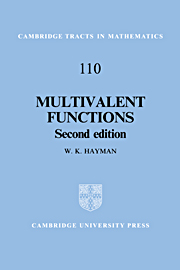Book contents
- Frontmatter
- Contents
- Preface
- Preface to the second edition
- 1 Elementary bounds for univalent functions
- 2 The growth of finitely mean valent functions
- 3 Means and coefficients
- 4 Symmetrization
- 5 Circumferentially mean p–valent functions
- 6 Differences of successive coefficients
- 7 The Löwner theory
- 8 De Branges' Theorem
- Bibliography
- Index
Preface to the second edition
Published online by Cambridge University Press: 24 November 2009
- Frontmatter
- Contents
- Preface
- Preface to the second edition
- 1 Elementary bounds for univalent functions
- 2 The growth of finitely mean valent functions
- 3 Means and coefficients
- 4 Symmetrization
- 5 Circumferentially mean p–valent functions
- 6 Differences of successive coefficients
- 7 The Löwner theory
- 8 De Branges' Theorem
- Bibliography
- Index
Summary
In the last 35 years the subject of multivalent and particularly univalent functions has developed rapidly so that it seemed necessary to expand this book considerably. In my choice of new material I have tried to concentrate particularly on fundamental results that are not contained in the two most important books on the subject, that by Pommerenke [1975] and Duren [1983]. Chapter 6 has been devoted to Lucas' bounds for coefficient differences of mean p–valent functions and some new results by Leung and Dawei Shen. I have included Eke's regularity theorems for the maximum, means and coefficients which make it possible to extend results to areally mean p–valent functions which had previously been obtained only for the much narrower class of circumferentially mean p–valent functions.
The most important event in the area of this book has been the proof by de Branges [1985] of Bieberbach's conjecture. Chapter 8 has been added to deal with this subject. I have also included in Chapter 3 results by Clunie, Pommerenke and Baernstein on the coefficients of univalent functions which are bounded or have restricted maximum modulus. Here we have the unusual phenomenon of a type of theorem where the results for univalent functions are significantly stronger than those for mean univalent functions.
Now that Bieberbach's conjecture is proved an analogous conjecture due to Goodman [1948] for the coefficients of p–valent functions constitutes perhaps the most interesting challenge in the area. It is mentioned at the end of Chapter 5.
- Type
- Chapter
- Information
- Multivalent Functions , pp. xi - xiiPublisher: Cambridge University PressPrint publication year: 1994

